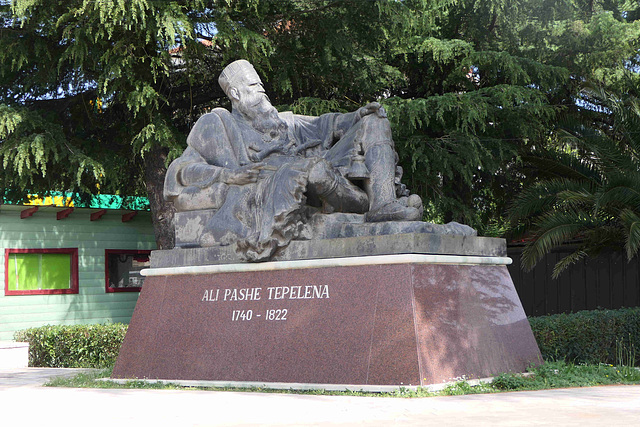Location
Lat, Lng: 40.294040, 20.021177
You can copy the above to your favourite mapping app.
Address: Ali Pashë Tepelena
You can copy the above to your favourite mapping app.
Address: Ali Pashë Tepelena
See also...
Keywords
Authorizations, license
-
Visible by: Everyone -
All rights reserved
-
43 visits
Tepelena - Ali Pascha


Ali Pasha was an Albanian ruler who ruled over large parts of Albania, Macedonia and Greece as an Ottoman Pasha. Under his rule, the country achieved a high degree of autonomy and was even able to remain virtually independent.
Ali Pasha was born around 1741 in the area around Tepelena and came from a highly respected family. He first appears in historical accounts as the leader of a band of brigands who became involved in many confrontations with Ottoman state officials. He joined the administrative-military apparatus of the Ottoman Empire, holding various posts until 1788, when he was appointed pasha,of the Sanjak of Ioannina. His diplomatic and administrative skills, his interest in modernist ideas and concepts, his Muslim piety, his respect towards other religions, his harshness in imposing law and order, and his looting practices towards persons and communities in order to increase his profits caused both the admiration and the criticism of his contemporaries. As his influence grew, his involvement in Ottoman politics increased culminating in his active opposition to the ongoing Ottoman military reforms. He was one of the most prominent leaders. After being declared a rebel in 1820, he was captured and killed in 1822 at the age of 81 or 82, after a successful military campaign against his forces.
Ali Pasha was born around 1741 in the area around Tepelena and came from a highly respected family. He first appears in historical accounts as the leader of a band of brigands who became involved in many confrontations with Ottoman state officials. He joined the administrative-military apparatus of the Ottoman Empire, holding various posts until 1788, when he was appointed pasha,of the Sanjak of Ioannina. His diplomatic and administrative skills, his interest in modernist ideas and concepts, his Muslim piety, his respect towards other religions, his harshness in imposing law and order, and his looting practices towards persons and communities in order to increase his profits caused both the admiration and the criticism of his contemporaries. As his influence grew, his involvement in Ottoman politics increased culminating in his active opposition to the ongoing Ottoman military reforms. He was one of the most prominent leaders. After being declared a rebel in 1820, he was captured and killed in 1822 at the age of 81 or 82, after a successful military campaign against his forces.
Annemarie has particularly liked this photo
- Keyboard shortcuts:
Jump to top
RSS feed- Latest comments - Subscribe to the comment feeds of this photo
- ipernity © 2007-2025
- Help & Contact
|
Club news
|
About ipernity
|
History |
ipernity Club & Prices |
Guide of good conduct
Donate | Group guidelines | Privacy policy | Terms of use | Statutes | In memoria -
Facebook
Twitter











Sign-in to write a comment.